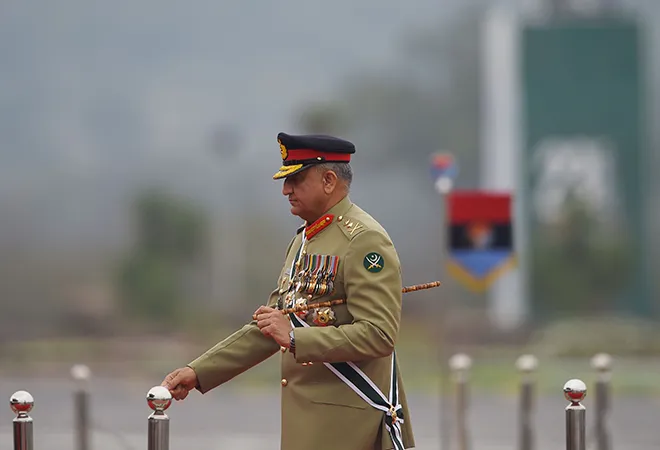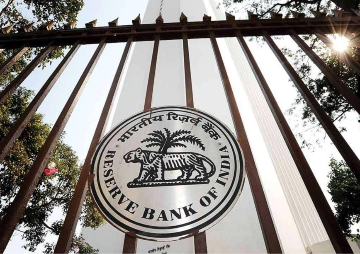
On the face of it, the speech of Pakistan Army chief, Gen Qamar Bajwa, at the inaugural Islamabad Security Dialogue (ISD) signalled a 180 degree shift in Pakistan’s strategic orientation. The emphasis on geo-economics instead of geo-politics was both refreshing and rational. Gen Bajwa pressed all the right buttons; said all the right things. He sounded reasonable and reflected a degree of realism not normally associated with Pakistani general officers. But as the old saying goes, if it sounds too good to be true, it probably is. Given the huge chasm that exists between the stirring speech made by Pakistan’s de facto ruler and the reality on the ground, what can one make of what Bajwa said? Is Pakistan and its all-powerful military serious about wanting to “bury the past and move forward”? Or, was the entire speech nothing more than a slick attempt to “re-cast Pakistan’s image” and showcase it as a “peace-loving nation”?
A high-profile federal minister in the Imran Khan regime seems to think that the speech was basically about projecting a positive image of Pakistan. According to him, Bajwa’s speech wasn’t aimed at India but at the rest of the world. Adding weight to this disclosure by the minister is a document drawn up by the Pakistan government, which lays out in detail the template that Pakistan must follow to sell its ‘national narrative’ to foreign audiences. Bajwa’s speech pretty much conforms to the strategic communications guidelines given in the document. If indeed the speech is nothing more than an image building exercise, then clearly the prospective peace process with India will not go very far.
Both countries will, of course, go through the motions to earn some brownie points. Some efforts will be made to lower the rhetoric and create a positive atmosphere. Prime Minister Narendra Modi has already taken the lead in this by wishing a speedy recovery to his counterpart from COVID-19 and has also extended greetings to the people of Pakistan on their national day. There will be some meetings held between officials, including at the political level. It is possible that a roadmap of sorts, on how to move forward, is also negotiated—basically talks about talks. Amidst all this, there will be the usual non-official stuff—Track-II meetings, sporting exchanges, the odd cultural exchange etc. Both sides will try to show that they are open to engagement. Neither side will want the other to gain any diplomatic points by appearing to be churlish and refusing engagement. But in the end, because both sides will be re-engaging not to make a breakthrough but to have a breakwater from extraneous pressures, it is a matter of time before the entire flimsy edifice being constructed breaks down once again. This will happen because, cosmetics aside, nothing would have changed on the ground. The best that can be hoped for is that there will be some mechanism in place—probably on the back-channel operating between the establishments of the two countries—to keep things from spiralling out of control.
The other possibility—which requires something far greater than a leap of faith to even consider—is that things might actually be changing. What if the Pakistani military establishment has realised that the cost of conflict with India is no longer sustainable? It is no longer just the direct economic and other costs that the hostility with India inflicts, but also the opportunity costs that the conflict imposes that are proving to be extremely expensive. Gen Bajwa’s speech was full of buzzwords like ‘connectivity’, ‘regional integration’, ‘human security’, and ‘trade and transit corridors’. All these concepts make a necessary fit for a foreign policy that puts geo-economics at its centre. Bajwa tried to hard sell Pakistan’s geo-strategic location as “a bridge between civilisations and connecting conduit between the regional economies”. He spoke about the opportunity to “unlock the untapped potential of South and Central Asia by ensuring connectivity between East and West Asia”.
But all of these grand plans will remain a non-starter without India. Perhaps the Pakistani generals have finally smelt the coffee and opened a proper atlas to realise that without access to India, Pakistan is a bridge hanging in mid-air. Connecting West Asia to East Asia, or Central Asia to South Asia, is not possible without India. The relevance of Pakistan's geo-strategic location in the context of geo-economics is only in relation to India—a market of 1.3 billion people and an economy that by the end of this decade is expected to emerge as the third largest in the world with a GDP of over US $5 trillion. But since August 2019, Pakistan has cut off all trade and commercial links with India. Clearly, if Pakistan is serious about geo-economics, connectivity, and emerging as a trade and transit hub, it needs to get out of the blind alley in which it has been pushed by Imran Khan’s unsustainable, untenable and unviable India policy.
But this is easier said than done because as Bajwa put it, “without the resolution of Kashmir dispute through peaceful means, process of sub-continental rapprochement will always remain susceptible to derailment…” He claimed Pakistan was ready for “resumption of peace process or meaningful dialogue” but first India would have to “create conducive environment” in Jammu and Kashmir. Because Bajwa said in his speech that Pakistan was making a “deliberate” choice “based on rationality” to resolve all outstanding issues with neighbours through dialogue in a “dignified and peaceful manner”, it is being assumed that when he talks about conducive environment, he is neither talking about UN resolutions nor about reversing the constitutional reforms made in Jammu and Kashmir in August 2019. In his speech, at least he didn’t mention both these ‘pre-conditions’. If a dialogue is contingent on these ‘pre-conditions’, then it will be dead before it even begins.
Here is the thing: If Bajwa and his military are reconciled to burying the past, then they will have to recognise and accept the fact that after August 2019, a new situation prevails in Jammu and Kashmir. Turning the clock back in J&K is simply not on offer, if it ever was. The most that can be expected is restoration of statehood. But this will either be the result of a judicial verdict, or an executive decision. If it is the latter, then it should ideally not be done as a sop to pave the way for a dialogue; instead it should be the result of something tangible Pakistan does to stop the flow of terrorists, supply of weapons and money to terrorists, the training and operational direction given to terrorists, and the propaganda support given to terrorists in the Union Territory.
While India could certainly agree to have a conversation with Pakistan on Jammu and Kashmir, it is nothing short of delusional for anyone to think that India would ever be ready to barter Kashmir or compromise on her sovereignty in J&K either for gaining land access to Afghanistan and beyond to Central Asia, or even to become part of the China–Pakistan Economic Corridor (CPEC). At the very least, such thinking betrays an astounding ignorance of not just India, but also basic economics, international trade and the strategy imperatives and nationalist impulses that go into the making of Indian policy. But Pakistani policy makers, and analysts and commentators who take their cues from the men in Khaki uniforms, are quite notorious for living in an alternate reality in which they invariably misread, misinterpret and miscalculate India.
Bajwa’s, and presumably the Pakistan Army’s, geo-economic vision rests on four pillars: Lasting and enduring peace within and outside; non-interference of any kind in the internal affairs of our neighbouring and regional countries; intra-regional trade and connectivity; and sustainable development and prosperity through establishment of investment and economic hubs within the region. The last two pillars of this vision are contingent on the first two pillars being erected. Without the first two pillars, the last two pillars are meaningless. So far, however, there is no evidence that Pakistan has taken any meaningful step to ensure peace in the region or to stop interfering in the internal affairs of both its neighbours on the east and west. This is critical because the entire geo-economic vision will have a chance only as a composite package. Pakistan cannot pick and choose some parts – connectivity, regional integration, positioning itself as a trade and transit hub – and reject other parts like normalisation of ties with India or continuing to fuel the violence in Afghanistan. In that sense, both Afghanistan and India are critical to Pakistan's future vision.
But, quite clearly, the implementation of the grand ‘vision’ that Gen Bajwa articulated will remain a pipedream until Pakistan walks the talk. This won’t be easy at all. There will be a lot of opposition from inside Pakistan, not just from the civilian street but also from the rank and file of the military. What Bajwa is trying to do, assuming he is trying to do it at all, is far more ambitious than what his predecessor Pervez Musharraf attempted with his four-point formula. As long as Musharraf was at the helm, everyone, including the generals, went along with him. But the moment he doffed his uniform, his formula was junked. If the backlash is very severe, the military will simply go back to its previous strategic template.
As far as India is concerned, while she is ready to dance this dance, she will be watching very carefully, and with great scepticism, every move and every step that Pakistan takes. India won’t let down her guard for a moment or get taken in by the seductive words coming from Pakistan (or so one hopes). If things move in the right direction, India will be happy to dance along; but if Pakistan reverts to form and tries to once again backstab India, it will give her yet another opportunity to expose Pakistan’s perfidy and treachery in front of the world.
The views expressed above belong to the author(s). ORF research and analyses now available on Telegram! Click here to access our curated content — blogs, longforms and interviews.




 PREV
PREV


